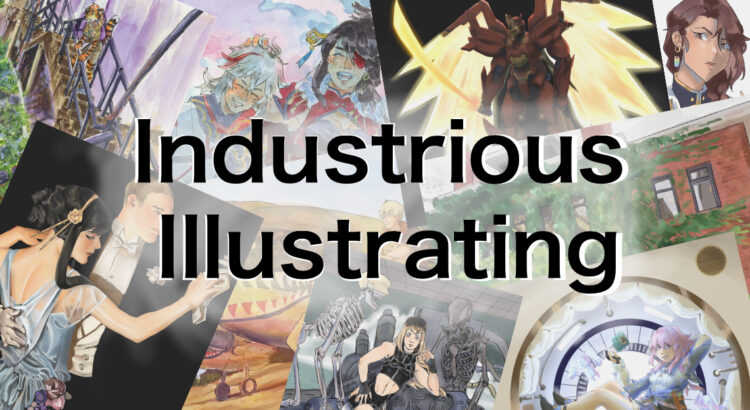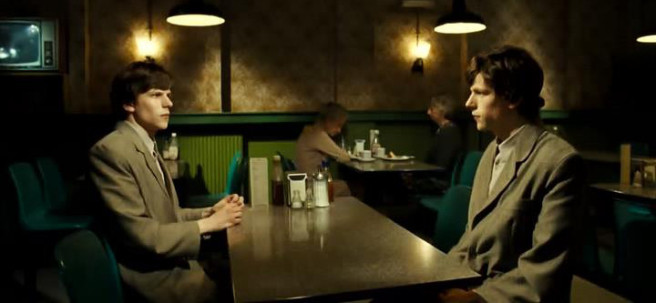The Double is a short novella originally written by Fyodor Dostoevsky, first published in 1846. If the name sounds familiar, you’ve probably read Crime and Punishment, arguably one of his most popular works. If it doesn’t sound familiar, you aren’t alone: his writing style is notorious for being dense and tiresome to read, meaning you won’t find his works on any coffee tables. The novella was adapted into a movie of the same name, which was released in 2011 and stars Jesse Eisenberg. I actually saw the movie first, which inspired me to read the book, so I’ll be discussing them in that order.
The first time I watched The Double, I thought it was complete nonsense. It was weird, the ending didn’t make any sense, and it was so boring that I almost fell asleep. I was disappointed, considering the concept looked interesting and it starred Jesse Eisenberg, who I’ve always loved in other movies. I wondered what I was missing; who would be pretentious enough to pretend that they liked it? Evidently it festered in my mind, because I ended up re-watching it over a year later when I saw it on Netflix. This time it was a completely different experience; I don’t know if maybe my tastes had changed, or if I was just paying more attention, but I absolutely loved it. It was entirely unique in every way; incredible acting, visually interesting scenes and filming, an absolutely gorgeous soundtrack which I highly recommend listening to, and an atmosphere that kept you on the edge of your seat. Out of these, I want to focus on the strange atmosphere that the film has, since I find that to be its most unique and defining element. Now if you’ve been reading my last few posts, you might have a feeling of where this is going: Surrealism. This movie is a prime example of Surrealism in film, and is a testament to the power of film as an art form.
I recognize this film as surreal because it has the same atmosphere as any other surreal work of art: a dense fog, a feeling of semi-nostalgia and anxiety, and an unexplainable otherworldliness. This is developed in the movie mostly through the use of its color palette, which includes yellows, browns, beiges, and other grimy colors. It’s odd to say the least, and it makes this universe seem like some parallel universe where everything is drab and lifeless. Also contributing to this surreal atmosphere is the vagueness of the whole movie. I can’t really say what time period it takes place in, what the setting is, or what the main character does all day. Every place seems so disconnected, which is so contradictory to normal life. The closest thing to experiencing this is going to North Campus after 9pm on a weeknight and walking to a bus stop. The towering brick walls, strange architecture, and the complete emptiness of life is similar to some abandoned dystopian parallel world, much like the universe of The Double. Another key element of the surreal atmosphere is obviously the story; the idea of the doppelganger, somebody who is identical to you in almost every way, induces anxiety in itself. Watching the main character Simon as he falls into madness at the hands of his doppelganger is terrifying, and it defines the universe of the movie as much stranger than ours. Finally, I think even the soundtrack contributes to this atmosphere, much more than your typical movie score. It’s mostly composed of string music and piano, with dark and heavy chords that create a tension throughout the film. Listening to the soundtrack by itself induces anxiety, and in the context of the film, it is the soundtrack of madness. Overall, this movie is a work of art in almost every way, and is fascinating to me as a lover of surrealist art. It’s just an unforgettable, personal experience that challenges what you think about traditional media.
This brings us to the novella, which I read promptly after finding out that it inspired the movie. It was the first thing I ever read by Fyodor Dostoevsky, and I can definitely understand why people say his books are a challenge. After forcing my way through it however, I was glad I did: not only is it an incredibly well written story, it is a great companion to the movie. While they aren’t exactly identical, as they aren’t meant to be, reading the book further revealed the true genius of the movie. The movie perfectly matched the atmosphere of the book, so much that it’s eerie. Maybe I was influenced by watching the movie first, but the book is a work of surrealism itself: it has the same bizarre atmosphere, which is developed through the writing and the events of the story. The way Fyodor Dostoevsky writes is so dark and heavy that it creates the same feeling of anxiety and fear, which is absolutely fascinating. I highly recommend watching the movie and reading the book, although I don’t suggest any particular order. I’d love to hear other people’s thoughts on it to see if people see what I see, or if I just sound completely crazy.
(Image Credits: Google Images)










